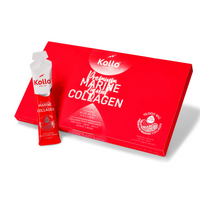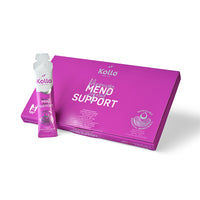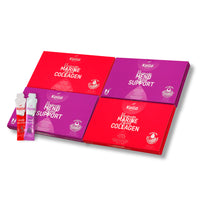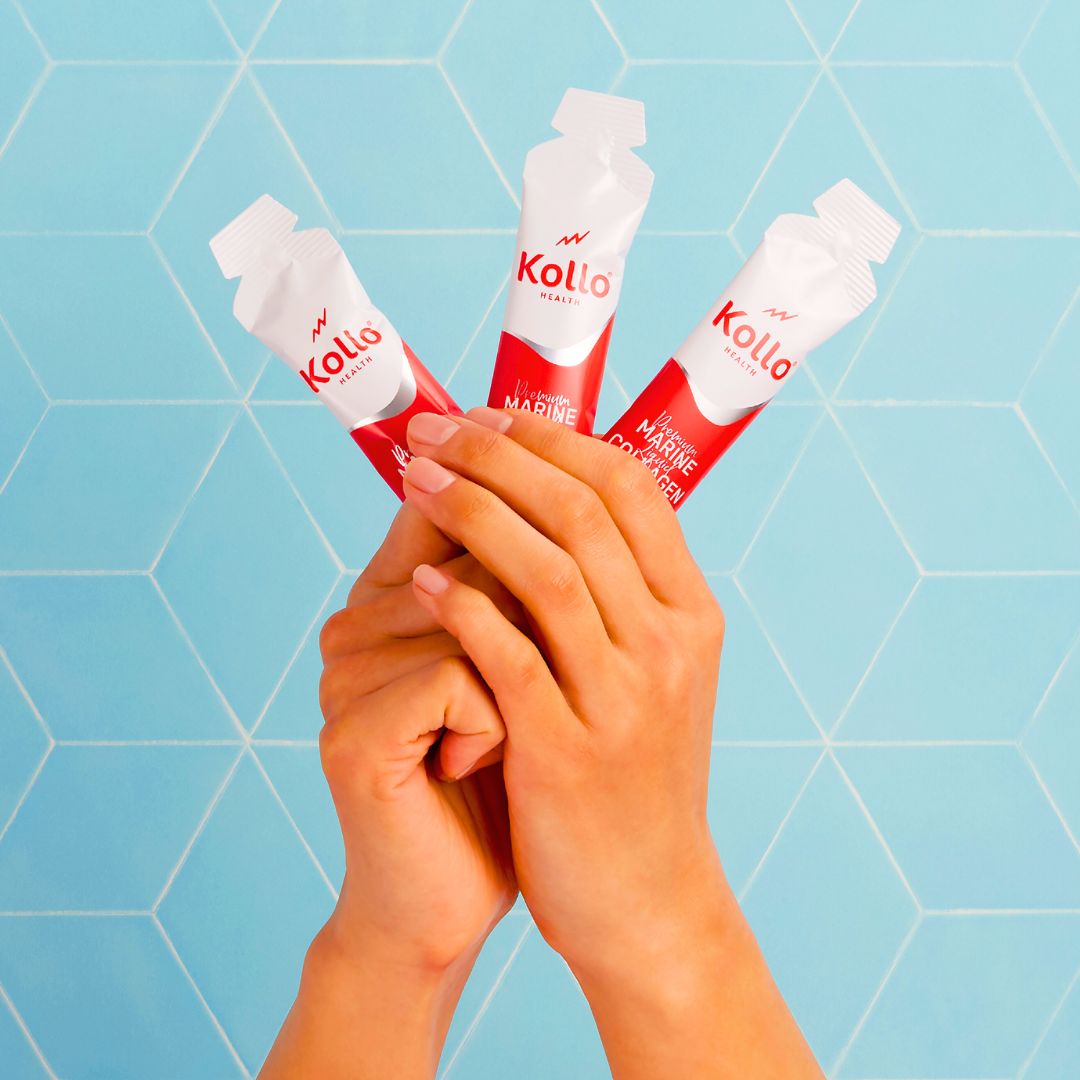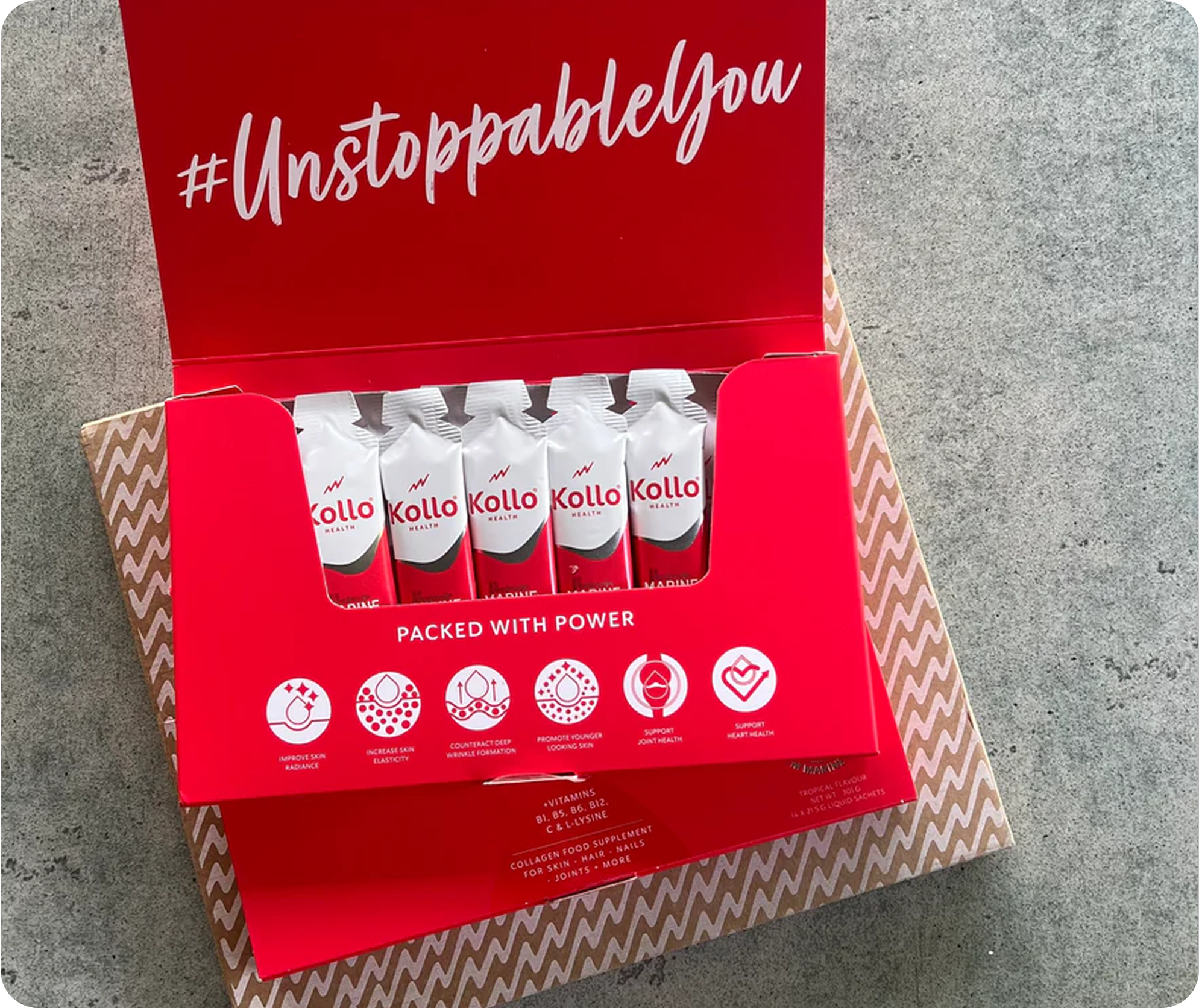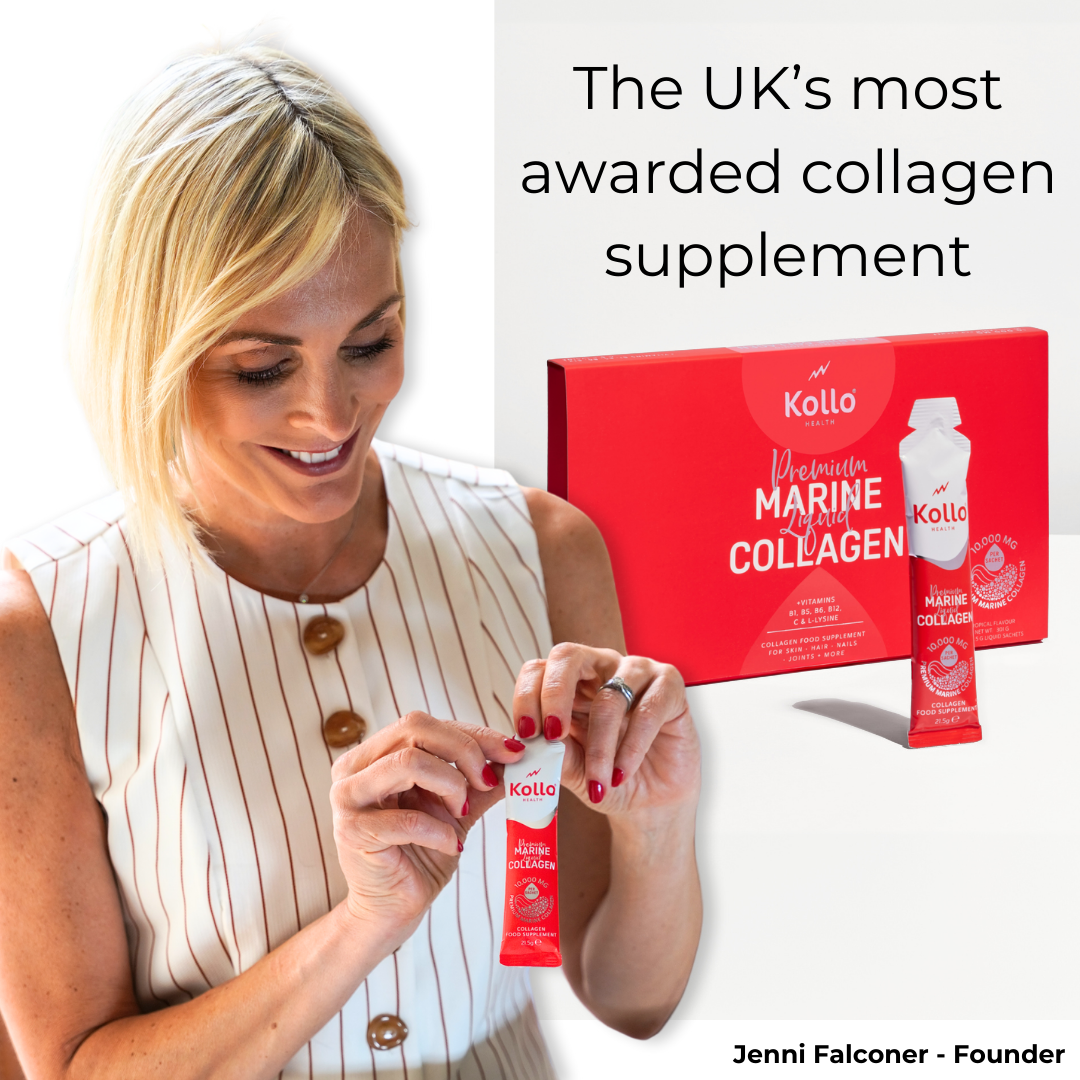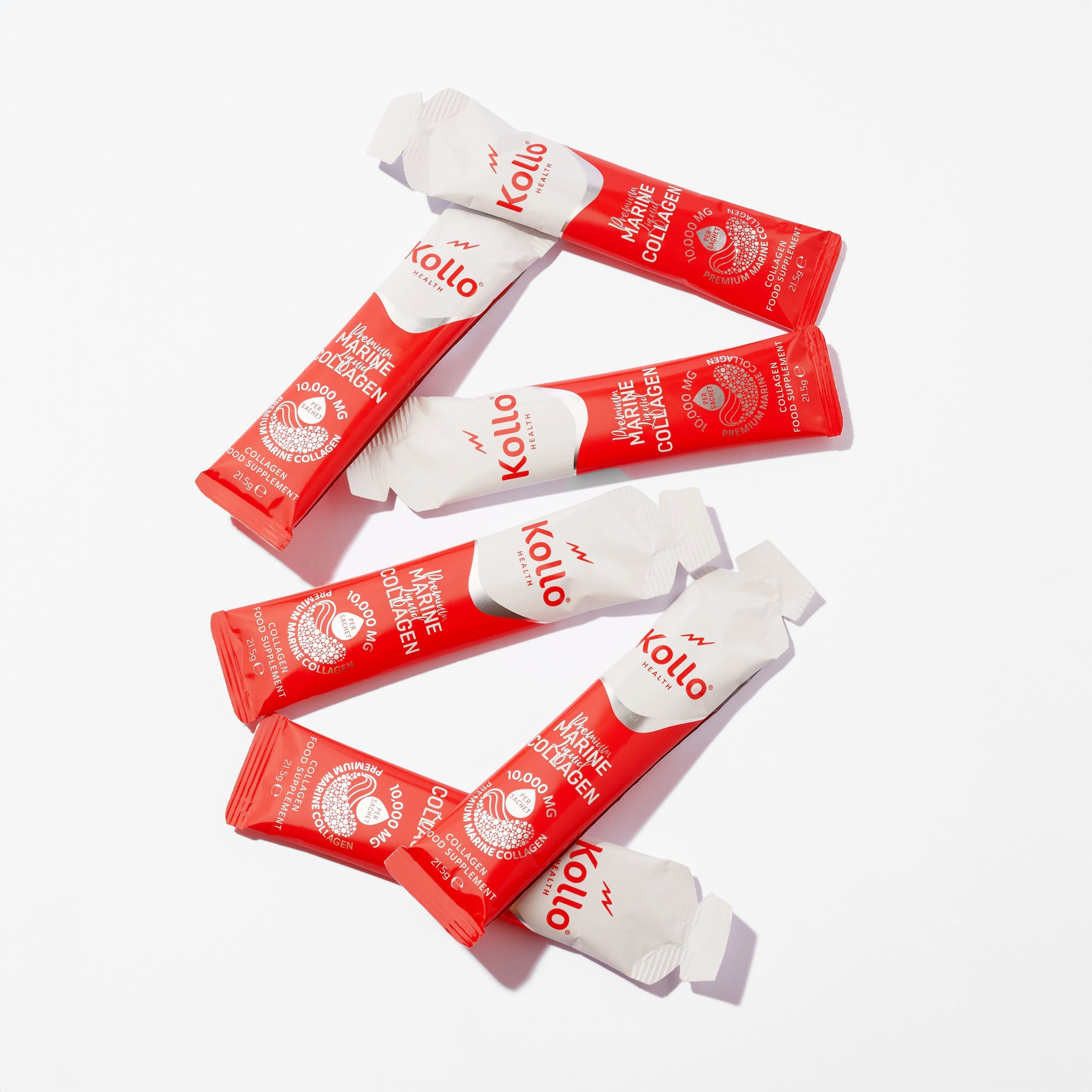Should I focus on supplements or foods for collagen?
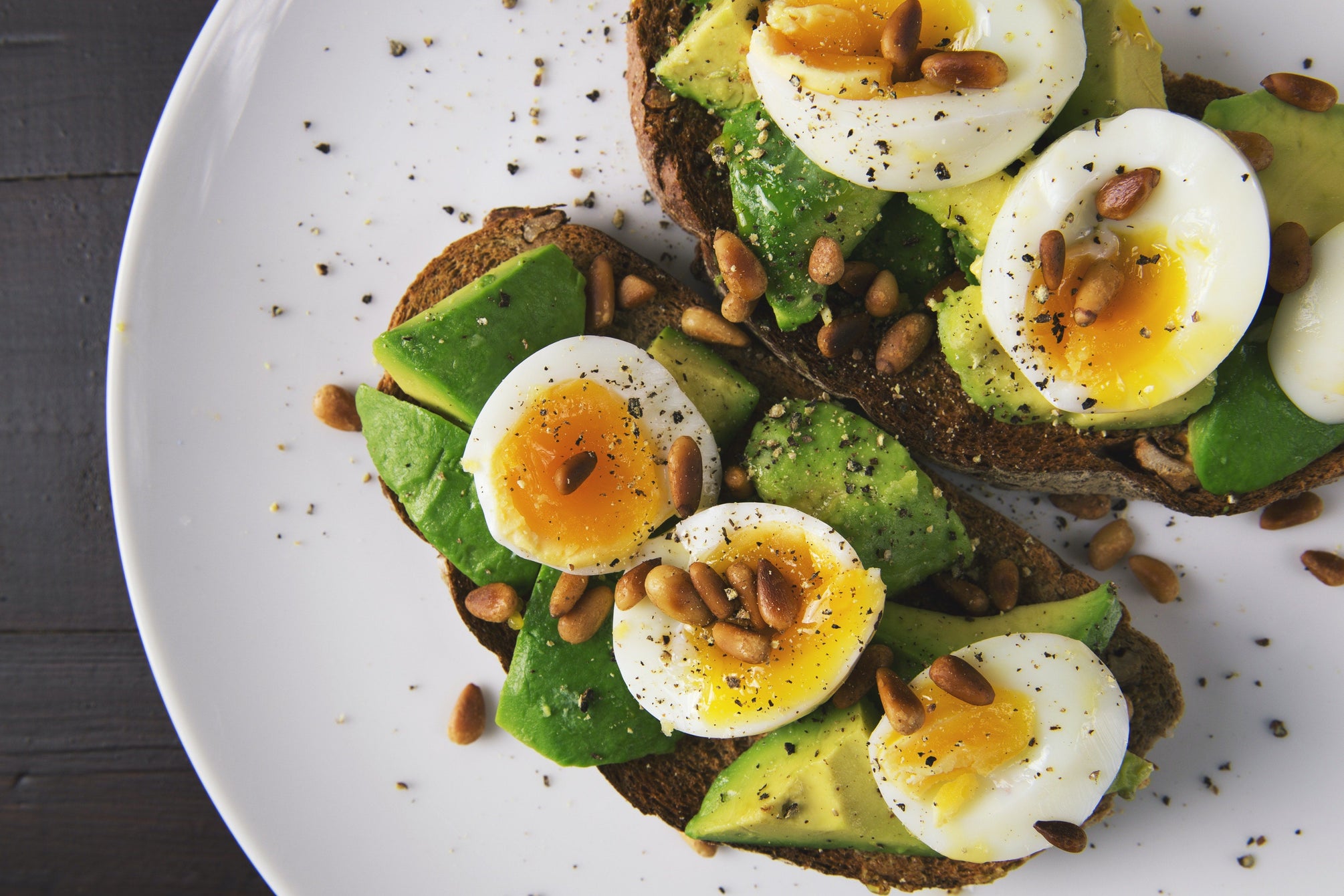
Should I focus on supplements or foods for collagen?
When it comes to building collagen in your body, the basic goal is to improve your health. It may be that you want to have younger looking hair, skin and nails. Or you may be trying to get healthier joints that don’t ache. Perhaps you are fighting bone loss related to menopause, or against the symptoms of a specific condition like eczema or osteoarthritis. Whatever your reasons, it is best to take a holistic approach. This means placing equal importance on supplements and foods for collagen, along with other lifestyle changes.
In this post, we will take a look at how important collagen supplements are, and also why it’s crucial to eat a range of different foods for collagen.
What does collagen do?
Collagen is like a glue that holds the structures of our connective tissues together. It provides cohesion and strength, yet suppleness and vitality. When we are abundant in collagen, our skin is plump and vibrant, our joints are supple and painless and our bones are thick and strong. Collagen is a protein that is present throughout our bodies and its role as a structural component is very important.
As we age, and our bodies are withered by things like sun exposure, smoking, poor diet, stress and more, we lose a lot of our collagen. Eventually, collagen is lost at a faster rate than our bodies can keep up with, so our overall collagen levels drop. This is a major factor in the early signs of ageing, such as:
• Wrinkles and sagging skin
• Thin, brittle hair and nails
• Pain and inflammation in the joints
• Loss of bone density
Certain things in life make this problem accelerate – midlife is one of them, particularly for women as menopause interferes with the balance of key hormones. Essentially, the decline in collagen in our bodies can reduce our quality of life. We may feel that we are losing our youthful looks, and we may experience discomfort as we move around. We may even develop serious, chronic health conditions like osteoporosis and osteoarthritis – all these things are largely due to the loss of collagen in our bodies.
What other factors cause ageing to happen?
Collagen loss is a big part of the early signs of ageing, but it is not the only one. The loss of elastin in our skin makes it lose its elasticity. Wear and tear on our joints from repeated movement causes the cartilage to diminish. Being overweight for a long time can put a strain on the skeleton and cause structural damage.
This is why, at Kollo, we always urge people to think of collagen supplements as a piece of the puzzle, but not the entire solution. If you want to slow the ageing process and even reverse some of the signs you are currently experiencing, you need to restore as much of your collagen as possible. But you also need to slow the rate at which collagen is being lost and do what you can to address the other issues that are causing your body to look and feel older.
How do collagen supplements help?
In order to produce new collagen, your body needs building blocks and fuel. These are amino acids that are fundamental to the creation of this particular type of protein. The most important ones for collagen production are glycine, proline and hydroxyproline. These particular amino acids, along with many others, are abundant in collagen molecules, and they are also primed for being used as the building blocks for collagen when they come from this source.
Animal collagen can be extracted from the skin and scales of fish, the bones and tendons of cattle and various other body parts from different animals. These parts of the bodies are the ones that are not often used for food. This means it is difficult to get actual collagen from diet alone. But when this collagen is extracted from these animal tissues and broken down into smaller, bioavailable amino acid chains called collagen peptides, they are ready to be quickly absorbed into our bloodstream through supplements to start fuelling the process of creating new collagen.
The advantages of getting these nutrients from collagen supplements include:
• The amino acids come from collagen molecules and are primed to fuel the production of new collagen
• The hydrolysed collagen in supplements is absorbed very quickly by the digestive system
• You get a huge amount of the key amino acids in every dose
• You consistently get the same amount of these nutrients each day so your body always has exactly what it needs
• They can be fortified with other key vitamins and minerals that are essential for collagen production
How do foods for collagen help?
While collagen supplements are an essential foundation, they are not the full solution for building collagen. You also need foods for collagen synthesis as the processes by which collagen is formed are complex and require many different nutrients. In order to efficiently and effectively build new collagen from the amino acids in your collagen supplement, you need:
• A range of B vitamins
• Vitamin C
• Copper
• Zinc
• Chlorophyll
• Other proteins
• Antioxidants
• Water
Eating a varied diet that is abundant in the full range of vitamins, minerals, healthy fats and carbohydrates is extremely important. Not only will these nutrients add more firepower to your ability to produce new collagen – they will help fight against the things that are destroying collagen in your body and they will supply the things you need to produce more elastin and maintain the health of your heart, circulatory system, gut, nervous system and more.
On the subject of food, there are also things you should avoid. Excessive consumption of refined carbohydrates and sugars can damage your collagen and also reduce the rate at which your body absorbs the other nutrients you give it. Too much alcohol can also be bad for your collagen. When thinking about what you are putting into your body, it’s not just about being mindful of giving yourself all the good stuff – you also need to try and limit the bad stuff!
Your body will thank you for it.
Is there anything else I can do besides take supplements and eat good food for collagen?
Making certain lifestyle changes will be beneficial for your collagen levels and also your general health in the pursuit of slowing the ageing process. The first changes to make, besides taking a collagen supplement and improving your diet, are:
• Avoid direct sunlight where possible and always wear sunscreen.
• Start a skincare routine that cleanses and moisturises your skin.
• Quit smoking – nothing good comes of it!
• Try to reduce stress in your life, or find ways to manage it. The cortisol hormone it produces is bad for your collagen and many other things in your body.
Another important piece of the puzzle is exercise. Exercise can lead to the release of hormones that make you feel good, relieving stress and doing good for your mind and body. It also improves the health of your lungs and circulatory system. Weight-bearing exercise also strengthens your muscles and helps with the removal of body fat. And it even strengthens your tendons, ligaments and bones, which could help bring about improvements in the distribution and quality of the collagen in your entire skeletal system.
Finally, make sure you get enough sleep. This is important for so many areas of your health, and your collagen is included in that!
Choose Kollo as your collagen supplement
The changes you make to your lifestyle and foods for collagen can be a little complicated, but choosing the right supplement doesn’t have to be. You want something with high purity, a real potency and proven effectiveness and a brand that you can trust. Kollo ticks all those boxes.
Our liquid collagen supplement is made from premium-grade marine collagen. The highlights of this are as follows:
• Marine collagen has high purity and is exclusively type I collagen – the most abundant form of the protein in our bodies.
• Marine collagen is known to be the most highly bioavailable animal collagen and we enhance this by breaking it down into collagen peptides and supplying it in a liquid suspension that doesn’t need to be broken down in your gut.
• A liquid suspension means you get the same dosage every day (we supply a huge 10g of hydrolysed collagen in every sachet).
• The liquid is fortified with B vitamins, vitamin C and l-lysine.
• It’s easy to take – simply empty a sachet into water and drink!
• The taste is great, made from sugar-free, natural tropical flavourings.
We have sold over a million doses of Kollo and have a strong, loyal customer-base. With thousands of 5-star reviews, a multitude of awards and features on platforms like Women’s Running magazine and ITV This Morning, we are recognised as a trusted brand. And our product is Informed Sport certified with ‘Amazon’s Choice’ status on the world’s biggest online retailer.
Learn more
We encourage you to do your own research about supplements and foods for collagen. Our website is packed full of information, including an extensive blog section with dozens of articles about different things relating to collagen.
Please take a look around and contact us if you have any questions – our team would love to hear from you.
